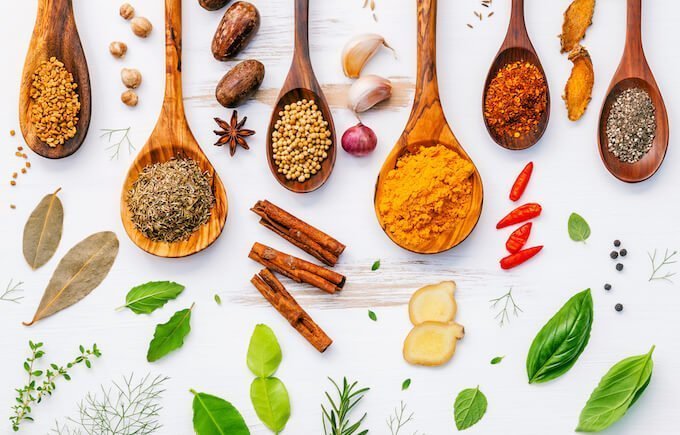Are Natural Flavourings High FODMAP?
- Low FODMAP diet
If you are doing the low FODMAP diet then you will be scrutinising every food label. You will have noticed that many foods contain ‘natural flavourings.’
This can be rather confusing when all the other ingredients are clearly labelled. This can lead to you avoiding even more foods just to be safe.
But, what are ‘natural flavourings’ and do they contain FODMAPs?
In this article, I will explain what this vague term means on the food label. I will also explain how you can tell if it is low FODMAP or not.

What Are Natural Flavourings?
According to the United States Food and Drug Administration (1);
“The term natural flavor or natural flavoring means the essential oil, oleoresin, essence or extractive, protein hydrolysate, distillate, or any product of roasting, heating or enzymolysis, which contains the flavoring constituents derived from a spice, fruit or fruit juice, vegetable or vegetable juice, edible yeast, herb, bark, bud, root, leaf or similar plant material, meat, seafood, poultry, eggs, dairy products, or fermentation products thereof, whose significant function in food is flavoring rather than nutritional.”
In other words – ‘natural flavours’ means ingredients which have been extracted from a natural source to flavour the food.
This source could be spices, herbs, vegetables and even meat.
Are Natural Flavours High in FODMAPs?
This may frustrate you, but the answer is……. it depends.
Natural flavourings will often (but not always) contain celery, onion and garlic. All these are high in FODMAPs.
Whether these are high in FOMDAP will also depend on the quantity that they are in.
Low FODMAP Diet and Natural Flavourings – USA
In the USA, foods are regulated by the FDA.
Onion, garlic and celery used as an ingredient will be labelled in the ingredients list and not under any umbrella term.
You will notice that each ingredient has a % next to it. This indicated the quantity of that ingredient.
Some ingredients do not have a % next to them because they are in amount of 2% or less. This should be safe for those with IBS because the amount would not be high enough to trigger symptoms.
Unfortunately, the story does not end there because FODMAPs can lurk under ‘natural flavours’ when used in a different format.
Ingredients such as garlic, onion or celery powder can be labelled as ‘natural flavourings’ (2).
Low FODMAP Diet and Natural Flavourings – Europe
All food in Europe is subject to EU law.
By EU law, all ingredients that end up in the final product must be labelled on the food label (3).
EU law also allows for flavourings coming from a natural source to go under the title of ‘natural flavourings.’ This can be extremely confusing.
Unlike the US, you will notice there are no quantities on the ingredients list. So there is no way of knowing how much of the flavouring is in the product.
How Can I Tell if Natural Flavourings Contain FODMAPs?
You can not tell if natural flavourings contain FODMAP without further investigation. This information is not publicly available and so you would need to contact the manufacturer of the food.
If you find that a product does contain FODMAPs in the natural flavourings, then there is no guarantee this will be safe to consume.
Unless that food has been individually tested by one of the FODMAP centres such as Monash, then it could be high FODMAP.
How Can I Avoid High FODMAP Flavourings?
As I already mentioned, you could contact the manufacturer directly. BUT, this is likely going to take quite a bit of time for each and every product.
Instead, look at it with a little common sense. Most savoury type products such as crisps, crackers or nuts will contain some form of FODMAPs. So avoid them if they have ‘natural ingredients.’
However, if you have a sweet or dairy product then it is likely safe to have.
Summary
Natural flavourings may contain high FODMAP ingredients which could trigger IBS symptoms.
To be safe whilst on the low FODMAP diet, avoid savoury foods containing ‘natural flavourings.’